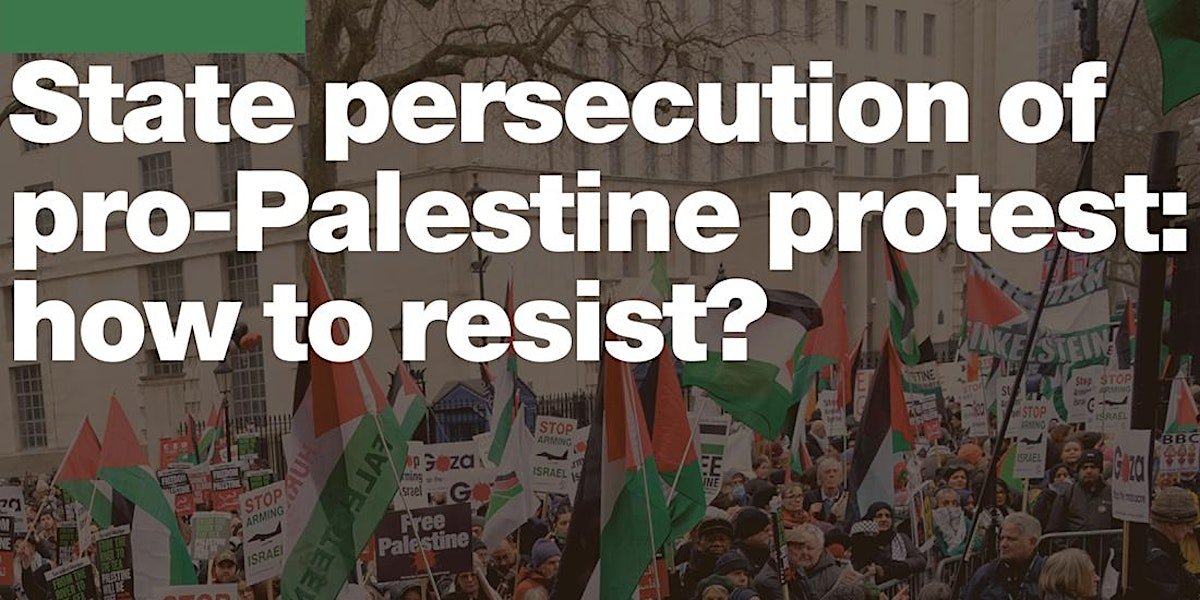Important message to all those planning to attend our event on Monday 16 June, 6pm - 8pm:
Unfortunately, Kim Johnson MP will no longer be hosting us at Parliament so we are moving our event online. We are sorry for the short notice but we hope to welcome even more of you to join us online to discuss these important issues! Please register here to access the joining link:
http://bit.ly/4e37Fs5
State persecution of pro-Palestine protest: how to resist?
Join us online for a vital public meeting on Monday 16 June, from 6–8pm to explore how the Palestine solidarity movement can effectively resist increasing state repression.
Tickets here: http://bit.ly/4e37Fs5
Hosted by Lord John Hendy KC, and sponsored by the Haldane Society of Socialist Lawyers, Jewish Network for Palestine (JNP), and Campaign Against Criminalising Communities (CAMPACC), this free event brings together leading voices to examine the legal and political tools being used to suppress protest—and how we can push back.
Speakers include:
Les Levidow (CAMPACC / JNP)
Simon Natas (ITN Solicitors)
Mira Hammad (Garden Court North Chambers)
Kevin Blowe (The Network for Police Monitoring)
Plus invited Palestinian activists
All are welcome.
“As mass protests have proliferated against Israel’s genocide since October 2023, state repression has attacked the right to protest. The Met Police have increasingly used the criminal law to harass pro-Palestine activists and journalists, most commonly for speech acts. Many arrestees have undergone various punishments without trial. Under the Criminal Justice Act 2003, courts have imposed bail conditions such as exclusion zones around protest sites, as was already imposed on many climate protesters. Some universities have called in the police to arrest divestment campaigners rather than engage with their demands. And some universities have sought to prevent protests through court injunctions, which can trigger a contempt of court decision, leading to imprisonment for up to two years.
Moreover, the police have used ‘counter-terror’ powers to impose worse punishments, e.g., by detaining arrestees for long periods, raiding their homes, and confiscating their electronic devices, thus turning them into non-persons. These punishments arise from the Terrorism Act 2000, whose powers established a permanent state of terror on false pretences of protecting the public. The counter-terror powers were meant to suppress political protest here against repressive regimes abroad, especially those supported by the UK. The powers facilitate this political role, regardless of whether arrests eventually result in No Further Action (NFA) or in prosecutions.
For their repressive practices, police have devised various pretexts. According to the police, activists have supposedly disturbed public order, encouraged terrorism, made antisemitic comments, or made Jews feel threatened. The latter pretexts have promoted a racist stereotype of Jews as pro-Israel so that state repression can pretend to protect ‘the Jewish community’. Deploying this alibi, the Met Police have prohibited the large Saturday protests from the BBC HQ vicinity, and likewise prohibited a Jewish anti-Zionist group from protesting anywhere in much of North London. Backed by fear-mongering as psychological warfare, the criminal law has helped to shield the British state’s support for Israel’s genocide”
- Les Levidow (CAMPACC / JNP)


